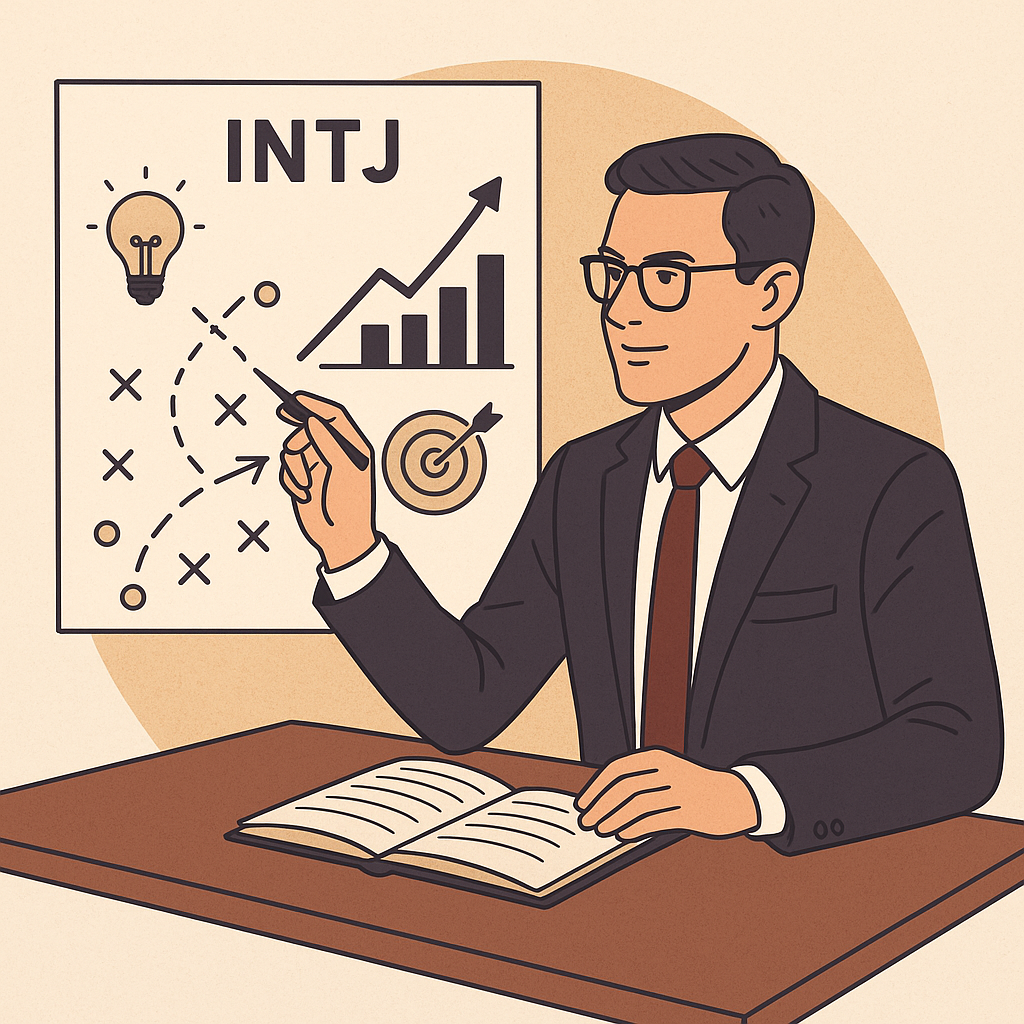
INTJs are long-term strategists who thrive when they can design systems, anticipate outcomes, and lead with clarity. Guided by their dominant function, Introverted Intuition (Ni), INTJs see future patterns and possibilities long before others do. Their auxiliary Extraverted Thinking (Te) helps them structure ideas into actionable steps, while their tertiary Introverted Feeling (Fi) keeps decisions aligned with inner values. Finally, their inferior Extraverted Sensing (Se) gives them flashes of awareness in the present, helping them refine their vision with real-world feedback.
With this unique blend of functions, INTJs are natural fits for careers that demand foresight, problem-solving, and innovation. Here are the top 10 careers where INTJs shine—and why.
1. Strategic Consultant
Ni helps INTJs cut through surface noise and recognize underlying problems, while Te organizes these insights into practical solutions. This makes them powerful consultants who can see inefficiencies others miss and design strategies that improve long-term outcomes.
2. Data Scientist or Analyst
INTJs rely on Ni to spot patterns in massive amounts of information and Te to quantify and structure those insights. Paired with Fi, they often pursue research that aligns with their values, such as improving healthcare or technology.
3. Software Engineer / Developer
Coding requires precision and forward-thinking—perfect for Ni and Te. INTJs excel at creating scalable systems that won’t just work today but will endure into the future. Their Se helps them adapt to new tools and technologies quickly.
4. Lawyer or Judge
The courtroom rewards strategy and foresight. Ni allows INTJs to anticipate arguments, while Te builds logical, structured cases. Fi ensures they maintain integrity, and Se helps them react in real time to shifting dynamics in trials.
5. Architect
Designing buildings and spaces blends vision with practicality. INTJs use Ni to envision innovative structures, Te to make them functional, and Se to ground ideas in the physical environment. Their Fi often drives them to design spaces that feel meaningful and purposeful.
6. Medical Researcher
INTJs’ Ni guides them toward breakthroughs others may overlook, while Te structures experiments and processes. Fi motivates them to pursue work that could impact lives for the better, and Se sharpens their awareness of details in laboratory settings.
7. Entrepreneur / Startup Founder
INTJs love independence, and entrepreneurship lets them channel Ni’s visionary thinking into building something new. Te handles execution and scaling, Fi ensures the venture stays aligned with personal values, and Se keeps them alert to market shifts and timing.
8. University Professor (STEM or Philosophy)
Teaching at the university level allows INTJs to share their Ni-driven insights, while Te helps them structure lessons and research. Their Fi pushes them to teach in areas they’re passionate about, and Se allows them to engage dynamically with students in real discussions.
9. Project Manager
Project management is where INTJs’ Te shines—organizing teams, systems, and processes. Ni lets them anticipate obstacles before they appear, while Fi ensures they treat their teams ethically. Se gives them flexibility when plans change unexpectedly.
10. Engineer (Civil, Mechanical, or Aerospace)
Engineering rewards precision and long-term vision. INTJs use Ni to foresee how systems will function decades into the future, Te to structure solutions, Fi to stay motivated by meaningful projects, and Se to work effectively with physical materials and data.
Why These Careers Work for INTJs
- Strategic Planning (Ni + Te): INTJs thrive where they can anticipate the future and implement systems that achieve it.
- Independent Problem-Solving (Ni + Fi): They prefer roles that let them follow their vision and values without excessive oversight.
- Adaptability (Se): Though less developed, Se helps them stay sharp and flexible when reality challenges their plans.
For INTJs, the most rewarding careers are those that combine strategy, independence, and purpose. Leaning into their natural cognitive functions allows them not just to succeed, but to transform industries and leave a lasting impact.
